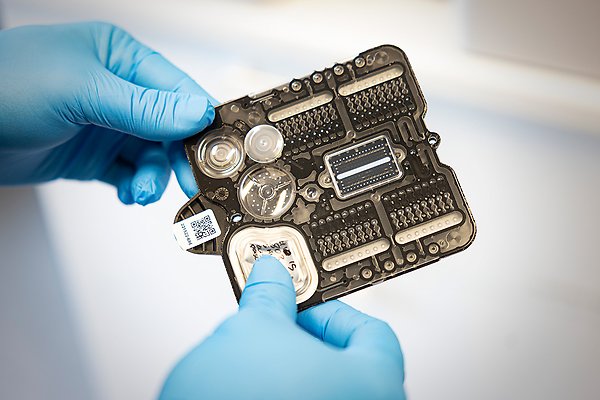Uppsala University Awarded International Prize for Innovation in Rapid Bacterial Diagnostics
The Longitude Award is a British innovation award that was first announced in 1714 to be given to whoever could determine the longitude at sea. In 2014, the award was announced for the second time, this time focused on rapid detection of antibiotic resistance – one of today’s major challenges in global health. The winner is Sysmex Astrego, a company founded in 2017 as a spin-off from Uppsala University.
– It is a fantastic recognition for this technology, and extra fun that it is such a good example of how basic research can lead to real benefit, says Johan Elf, who is a professor of physical biology.
Sharpen the tools
In his research group, bacteria have long been studied with microscopy and microfluidics. The methods were further developed in 2015 when PhD student Özden Baltekin was to study variation in growth between single bacterial cells and the molecular mechanisms behind it.
– We had sharpened the tools and discussed with Dan Andersson, professor of medical bacteriology, about how we could use the technology in diagnostics. Dan mentioned the Longitude Prize and it became clear that a quick test would be important. We immediately investigated how quickly we could determine whether the bacteria in the lab responded to antibiotic treatment and it was done in just a few minutes.
A company was required
It became clear to the researchers early on that the test went faster than was thought to be biologically possible.
– We understood that it required a company to move on to the next step and also make the test robust, user-friendly and cheap. Thanks to my industry mentor Ove Öhman, we dared to invest in this and recruited the team that together started the company Astrego Diagnostics in 2017, says Johan Elf.

The urine sample is analyzed using a disposable cassette that contains different types of antibiotics. Photo: Mikael Wallerstedt.
In 2022, Astrego was bought by the Japanese company Sysmex, which took development and production further. Since then, Johan Elf has devoted himself to research at universities, but he was present when the prize was awarded at a ceremony at the Science Museum in London on 12 June.
The first test, which is for urinary tract infection, radically changes the conditions in healthcare. Already after 15 minutes, the test shows whether it is a bacterial infection and in less than 45 minutes which type of antibiotic can be used. Previous tests for antibiotic sensitivity have had to be analyzed in hospital labs with a waiting time of 2–3 days.
Speed is crucial
Speed is decisive for Sysmex Astrego now being awarded the Logitud prize. One of the prize committee’s demands was that healthcare professionals would have time to do the test before they prescribe antibiotics for the first time.
– What is unique is that the test can be done at the health center, so that you choose the right antibiotic already during the first meeting with a doctor or nurse. With the help of the test, you can therefore reintroduce antibiotics that have been abandoned due to a high level of resistance in the population, but which still work if you can find out which patients do not have resistant bacteria, says Johan Elf.
The prize-winning instrument will be exhibited at the museum alongside John Harrison’s chronometer which won the first Longitude Prize in the 18th century and Alexander Fleming’s penicillin mold from 1928.

